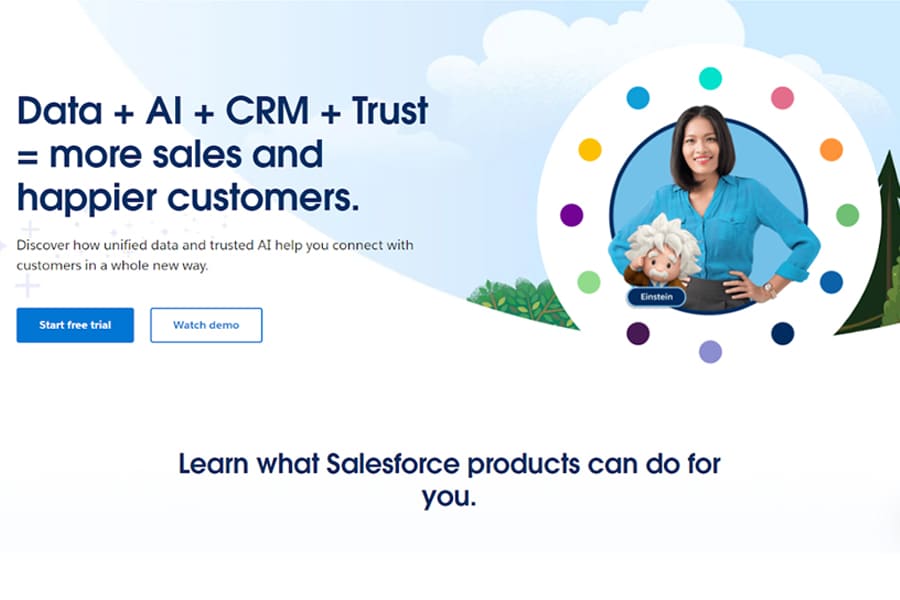
If you own a business, you know how crucial data is. An abundance of data is supposed to be a good thing, but lately, companies are drowning in data. You’re very much behind if you don’t know how to use Salesforce or other CRMs.
Customer relationship management platforms are a must in today’s data-driven landscape, so read below to learn how to use Salesforce to maximize your business potential.
Introduction to Salesforce for E-commerce: Benefits and Integration

Customer data is everywhere, whether you’re an online business or not. Most companies only keep track of the minimum data to function. Most of our beloved Filipino sari-sari stores don’t collect their customer’s phone numbers.
However, as businesses grow bigger, data becomes more and more important. They use it to control production, optimize marketing strategy, and predict consumer preferences.
Of course, that generates a ton of data.
Before CRMs like Salesforce, businesses grappled with these data through traditional CRM software called legacy systems. These systems are made from the ground up specifically for the company and often tend to be incredibly limited, highly complicated, and expensive.
Systems like spreadsheets tried to address this, but they are very limited and fail to meet the needs of larger companies.
This was a universal challenge, but the drawbacks of conventional CRM systems are more pronounced for Filipino businesses where personal connections are paramount.
When Salesforce was first released, it revolutionized the entire game. For one, it uses cloud computing, so data doesn’t have to be stored in the company’s hard drives anymore but on the cloud, making it vastly more practical and accessible.
More than that, the company eventually developed other products and integrations that made ripples in the enterprise data management discipline.
Salesforce Integrations and Benefits
While a CRM platform at the core, Salesforce has grown into a data-management suite. This entire ecosystem is called the Salesforce customer success platform.
But it has grown into an ecosystem of products and ecommerce integrations. To overview a bit, the Customer Success Platform is composed of different cloud products and integrations with specific use cases.
Let’s review them below:
- Salesforce Sales Cloud: The sales cloud empowers sales teams with tools for sales enablement, force automation, and lead management to optimize the company’s sales funnel, sales leads, and sales cycle.
- Salesforce Marketing Cloud: Facilitates marketing automation, customer journey mapping, social marketing, and more for targeted campaigns.
- Salesforce Service Cloud: Automates processes and consolidates information to improve customer experience.
- Salesforce Community Cloud: Facilitates internal and external communication among employees, partners, and contractors.
- Salesforce Analytics Cloud: Also called Salesforce Wave Analytics, this tool delivers analytics and business intelligence for data residing in Salesforce Clouds or third-party applications. It differs from Einstein Analytics because it can integrate with other Salesforce Clouds, while Einstein is only for use within its existing CRM applications.
- Salesforce App Cloud: The application enables functionality development within Salesforce Clouds or third-party applications aligned with the Salesforce portfolio.
- Salesforce Commerce Cloud: Streamlines e-commerce operations, enhancing the online shopping experience.
- Salesforce Health Cloud: Tailored for healthcare, consolidating patient data and improving healthcare interactions.
- Salesforce IoT Cloud: Manages and analyzes data from connected devices, facilitating Internet of Things (IoT) initiatives.
Salesforce cloud services are dedicated to putting customers at the center of everything businesses do. It’s no surprise that they call themselves the Customer Company.
Setting up Salesforce for E-commerce: Account and Configuration

Using the Salesforce platform begins with knowing its most basic elements: the Salesforce Accounts.
In Salesforce, an account is a business entity with which the company interacts. Accounts store information about customers or people a business is engaged with.
There are two main types of accounts in Salesforce:
- Business Accounts: These accounts store information about the companies a business is engaged with, typically used for business-to-business (B2B) relationships.
- Person Accounts: These accounts store information about individuals that the company is doing business with, often used for business-to-consumer (B2C) relationships.
Accounts in Salesforce serve as a central repository for customer data and interactions.
They are essential for you to manage customer relationships and can be associated with various other Salesforce objects such as contacts, opportunities, and cases to provide a comprehensive view of customer activities that the company can use throughout multiple departments. Businesses can manage these accounts through customized configurations.
Your platform can be modified precisely to your specifications by adding or changing fields, adding attached apps, customizing permissions, and more. This way, your Salesforce platform can be as unique as your business.
Syncing Customer Data: Integrating E-commerce Platform with Salesforce
Integrating Salesforce into an existing e-commerce platform lets business owners keep what they’re used to. Still, with the added benefit of improved customer experiences, streamlined data flows, and enhanced marketing campaigns.
This is one of Salesforce’s strengths. Before Salesforce, CRMs were custom-built, expensive, and could only do some features that Salesforce customers enjoy.
There are two ways that e-commerce platforms can integrate into Salesforce:
- Using third-party plugins. One common approach is to use third-party plugins like Exalate, Nektar, Gong, and more to synchronize data between Salesforce CRM and a separate e-commerce platform.
- Developing custom integrations. Businesses with specific requirements or multiple Salesforce products need to consult with a professional services team for an integration fully customized to their needs.
If you want to use Salesforce services without the added hassle of third-party plugins or hiring professionals, there’s an easier solution: the Salesforce Commerce Cloud.
This e-commerce platform provided by Salesforce offers B2C and B2B capabilities, order management features, and more.
Managing Product Catalog: Creating and Organizing Product Data
Efficient e-commerce is only possible with well-organized product data.
The platform has a variety of solutions to make product data organization streamlined more than ever:
- Products: If you’re an admin or sales operations manager, you can create products in your Salesforce platform. These products represent the company’s actual offerings and will contain all the necessary data like stock numbers, standard active prices, and even feature custom product fields.
- Catalogs: Organizations can use the Business Manager tool to create and manage catalogs of these products for easier tracking.
- Categories and hierarchies: You can also create categories for every product catalog and create product hierarchies to organize product offerings.
The ability to create and organize a product catalog across your e-commerce business is a must when it comes to a CRM solution. Fortunately, this is a stand-out feature for Salesforce.
Order Management: Tracking and Processing Online Orders

Effective order management is non-negotiable for many businesses today. According to Insider Intelligence, online orders account for 20.8% of all retail buys, with the rates expected to rise to 24% in 2026. Being a $6 trillion industry, calling the online e-commerce sphere “competitive” would be an understatement.
In the Philippines alone, 32% of Filipino consumers shopped online weekly. Customers will turn to someone else if your business has issues tracking and processing online orders.
Fortunately, Salesforce’s key features help with online order management:
- Unified order dashboard: Access a centralized view of all orders, minimizing the risk of oversight.
- Automated order processing: Leverage automation to swiftly process orders across your platforms, reducing manual workload and eliminating the possibility of human error.
- Inventory integration: Seamlessly integrate with inventory systems to ensure accurate stock tracking.
- Real-time order updates: Receive instant updates on order status, enhancing customer communication.
- Customizable workflows: Tailor order processing workflows to align with specific business requirements.
Salesforce equips businesses with robust order management tools, addressing the growing demand for streamlined processes.
Customer Relationship Management (CRM)

In an information-saturated and option-rich era, growing companies shouldn’t just prioritize enterprise resource planning — customer relationship management is a must, too.
CRM is a technology for managing everything concerning a company’s relationship and customer interaction.
Businesses employ CRM to:
- Improve customer relationships and drive loyalty;
- Nurture potential leads until they become paying customers;
- Gather customer information for marketing processes, data analytics, and more.
Poor customer service costs businesses anywhere from $75 billion to $1.6 trillion annually. Customers who don’t feel valued and nurtured will quickly turn to those who do.
On the other hand, businesses that build their customer relations reap all the benefits. Salesforce enables organizations to do just that.
Personalization and Targeted Marketing
In the digital age, customer personalization and targeted marketing are not just good-to-haves; they’re necessities.
According to Salesforce’s Fourth Annual State of Marketing Report, 52% of consumers and 65% of business buyers will switch brands if the vendor doesn’t personalize communications. This is true for Filipino consumers as well.
Salesforce enables optimal personalization and targeted marketing through the Salesforce Marketing Cloud Personalization (previously Interaction Studio).
The Marketing Cloud is a powerful tool that helps sales teams and individual sales representatives achieve consistent, contextual, and pertinent dialogues with customers across channels and touchpoints.
E-commerce Analytics and Reporting
Analytics and reporting are critical for businesses that want to make informed business and marketing decisions. According to McKinsey & Company, analytics play a pivotal role in customer performance.
Without using data, businesses are running blind in a hyper-attentive and uber-competitive environment.
Salesforce enables best-of-class e-commerce analytics and reporting through its Commerce Cloud platform. This powerful tool provides several key features and functionalities to allow businesses to track and analyze their e-commerce data.
Let’s review them below:
- Reporting tools: Salesforce Commerce Cloud provides reporting tools that help businesses understand key KPIs based on aggregate data so they can make informed business decisions and take action more effectively.
- Real-time analytics and AI-driven insights: Provides cutting-edge, AI-driven analysis that enables businesses to track customer behavior and other key metrics in real-time.
Another important feature is the customizable dashboards. Provides customizable dashboards that allow businesses to add or remove displayed parameters so that the dashboard remains 100% relevant to the needs of the business.
Customer Support and Service
Customer support and service are crucial for businesses to maintain customer satisfaction, loyalty, and growth.
Patrons are highly sensitive to corporate interactions, with 66% saying bad customer service ruins their day and 73% saying they will go to a competitor after a bad service experience.
Salesforce has the Service Cloud platform, which delivers powerful features that allow businesses to enable top-of-the-line customer support and service.
Some of them include:
- Omnichannel customer support: Salesforce Service Cloud supports various channels, such as phone, email, text, chat, and social media, all at once.
- Integration with CRM: Integrated with Salesforce CRM, this platform provides your sales team with a 360-degree customer view, including customer behavior, purchase history, preferences, and contact information.
- Intelligent routing: Uses AI and machine learning to prioritize customer requests and automatically assign them to the most appropriate customer service reps to improve response times and resolution rates.
- Self-service portal: Allows businesses to create a self-service portal customers can use to find answers to important questions without contacting customer service.
Last but not least, advanced analytics. Provides advanced reporting tools that help businesses track and make data-driven decisions to improve their customer service.
Marketing Automation with Salesforce Marketing Cloud Integration
If your business is not using ecommerce automation, it’s losing massive amounts of time and resources doing unnecessarily repetitive tasks — with terrible results.
A study by the Annuitas Group reveals that companies using automation to nurture prospects see a 451% increase in qualified leads, and those nurtured leads make purchases 47% larger than their non-nurtured counterparts.
Here are just some of the processes that this platform automates:
- Data collection and analysis;
- Lead generation and nurturing;
- Campaign performance tracking;
- Customer personalization through the Marketing Cloud Account Engagement feature.
With the Salesforce Marketing Cloud, you can reap all the benefits of saved time and resources and higher lead generation rates.
Ecommerce Data Insights and Predictive Analytics with Salesforce Einstein

Predictive analytics, when done right, has the power to transform business performance completely. And businesses today are swimming in relevant data. More information was created in 2017 than during the last 5000 years.
Businesses make full use of data and analytics to make informed decisions. And you can get the best tool for the job through Salesforce Einstein Analytics.
Here are some of their features:
- Automated data collection and analysis: Website activity, customer interactions, and third-party data providers are automatically collected and analyzed to generate insights businesses can use for better decision-making.
- AI-powered insights: Uses AI and machine learning to provide businesses with insights into customer behavior, business trends trends, and other key metrics.
- Real-time analytics: Enables businesses to track customer behavior, sales trends, and other key metrics in real-time.
Another feature to have in mind is the customizable dashboards. This feature allows businesses to add or remove displayed parameters so that the dashboard remains 100% relevant to the needs of the business.
Final Thoughts

In today’s e-commerce landscape, managing customer data isn’t just an option anymore.
Businesses need to have a comprehensive and specific strategy, or else they will be outcompeted by those who do. Customers don’t just choose who has the best or cheapest product. They will gravitate towards vendors that build a relationship with them, anticipate their needs, and personalize their experience.That’s why businesses need to know about Salesforce services. With affordable CRM software tailored to your strategy, you can take customer relationships to the next level.
Frequently Asked Questions
How user-friendly is Salesforce for non-techy users?
Extremely user-friendly. Salesforce prioritizes intuitive interfaces, ensuring easy navigation and accessibility for all users.
How does Salesforce handle data security and privacy?
Salesforce employs state-of-the-art security measures and compliance standards to safeguard your data and ensure privacy.
Is Salesforce suitable for small businesses?
Absolutely. Salesforce offers tailored solutions like Essentials, providing robust CRM features for small businesses without paying for their larger, more extensive services. You can always upgrade as your services grow.